New Zealand’s national men’s hockey team, the Ice Blacks, have recently seen assistant coach Anatoly Khorozov take over the reins as head coach from Maru Rout. His first assignment is the IIHF Division 2 – Group B World Championship in Spain this April, where NZ face old rivals Mexico, along with Spain, Israel, DPR Korea, plus the recently promoted Luxembourg.
A strong extended training squad was announced back in October and the traveling team will be named next month. After finishing with silver last year and remaining in the same division, anything less than winning gold and earning a promotion to Division 2 – Group A will be seen as a disappointment.
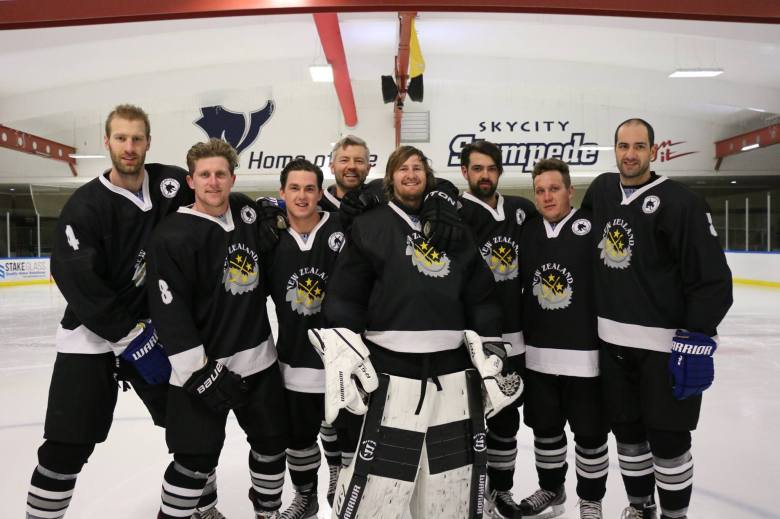
New Zealand Under-20s
New Zealand’s under-20 men’s national team (more affectionately known as the ‘Junior Ice Blacks’) has also seen a coaching change with Justin Daigle now running the bench.
While playing for the West Auckland Admirals as a crucial part of their blueline, Daigle has been transitioning further into coaching roles. In 2017 he served as assistant coach for the Junior Ice Blacks at the IIHF Division 3 World Championship held in Dunedin, working with fellow coaches Matt Sanford, Perry Wilson and Anatoly Khorozov, who has now moved into the head coaching position with the Ice Blacks.
Next month’s Division 3 tournament in Bulgaria is his first big test – coaching an under-20s squad full of promising junior players (including Moses Bygate-Smith, Ryan Martinoli, and Ben Harford) to reach their goal: winning the gold medal game.
The last time the Junior Ice Blacks made it to Division 2 was back in 2009. Unfortunately the team were unable to compete that year due to the financial constraints that can come with traveling around the world for these tournaments, subsequently New Zealand has remained in the third division ever since. They will need to come out on top over Australia, Bulgaria, China, Iceland and Israel if they were to be promoted – considering recent strong showings by some of those nations, it’s a hard task but it’s certainly not a challenge that Daigle and his team will shy away from.
Side note: The only IIHF tournament New Zealand will host this year is the Men’s Under-18 Division 3 – Group B World Championship at the Queenstown Ice Arena in April.
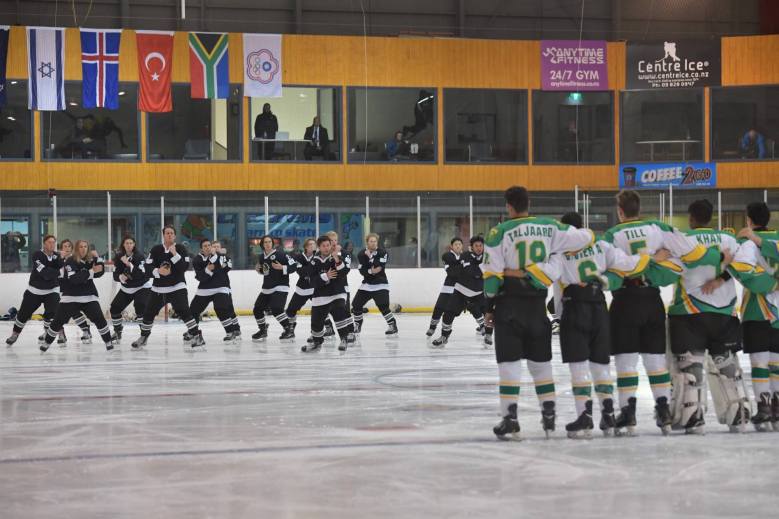
Ice Fernz
In March New Zealand’s national women’s team, the Ice Fernz, will be travelling to Spain for the IIHF Division 2 – Group B tournament where they will be up against Iceland, Turkey, Romania, Chinese Taipei, plus the host country. Led by captain/scientist Helen Murray with former Botany Swarm head coach Andreas Kaisser calling the shots from the bench, the Ice Fernz will be looking to improve upon their bronze medal placing at last year’s tournament in Iceland.
Also in March, the Women’s Under-18 development side will be in Kuala Lumpur for the 2018 IIHF Challenge Cup of Asia. Having won the tournament in their first attempt last year, they will be back to defend their gold medal status in the top division against Thailand, Singapore, and Chinese Taipei U18.
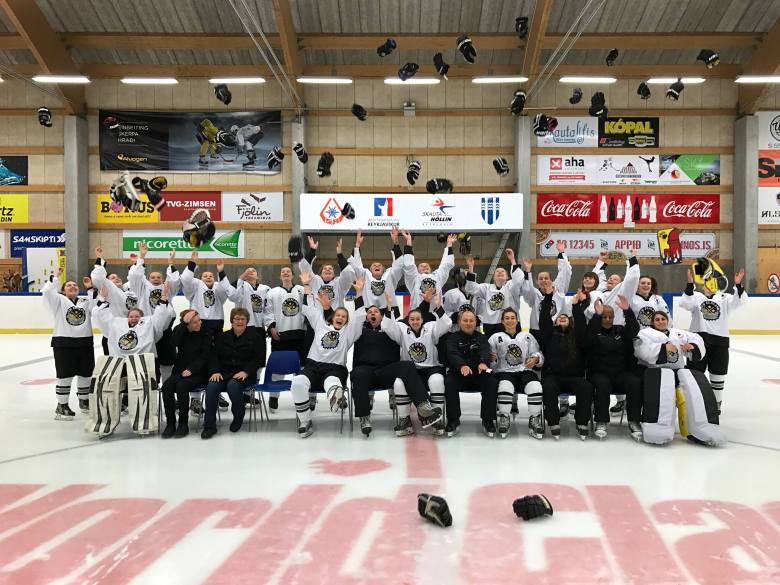
The 2018 NZIHL Season
The Skycity Stampede were on a roll this past NZIHL season as they secured their third championship in a row – joining the Canterbury Red Devils as the only other club to accomplish such a feat. However, the 2017 title may need to come with an asterisk after news broke last month that Mitchell and Lachlan Frear were suspended for two years by the Sports Tribunal of New Zealand after they were found guilty of naively buying the banned substance clenbuterol online.
With the suspension backdated to January 1st 2017 this includes the 2017 NZIHL season in which the Frear brothers were part of Queenstown’s championship-winning team. Under the NZIHL rulebook section 10.11 states “All competitive results achieved during the period of Ineligibility, including retroactive Ineligibility, shall be Disqualified.”
Puck Yeah consulted with the New Zealand Ice Hockey Federation on this subject and we were told that the fate of this matter rests on whether or not the league’s four other teams would request a review of the situation. In a recent podcast Puck Yeah debated if this would happen but ultimately we believe that the teams are going to let this go and move on. After all, it was a silly mistake that has seen some tough lessons learnt, plus two players don’t make the team – the Stampede would have been a competitive side with or without the suspended Frear brothers.
So, that brings us to the 2018 season. Ultimately I don’t see the Stampede finishing as champions again, but it could be a year where counting out any team is a risky move.
The West Auckland Admirals have gone from strength to strength over the past couple of years and will be looking to avenge their Birgel Cup finals defeat. The Botany Swarm have shaken up their front office and coaching staff in a move that could reinstall a winning culture that saw the East Auckland side previously dominate the league. The Dunedin Thunder were the dark horse of the 2017 season and continue to improve as they aim to go one step further and secure a finals berth, meanwhile the Canterbury Red Devils need to recover from a lacklustre campaign that saw them at the bottom of the table for the first time since 2005, the NZIHL’s inaugural season.
Mix in the league’s involvement with the 2018 Ice Hockey League, next season is hopefully one that will pack out the local arenas as New Zealand’s top hockey clubs battle it out for the Birgel Cup and the Toa Kauhanga Riri Tio challenge trophy.
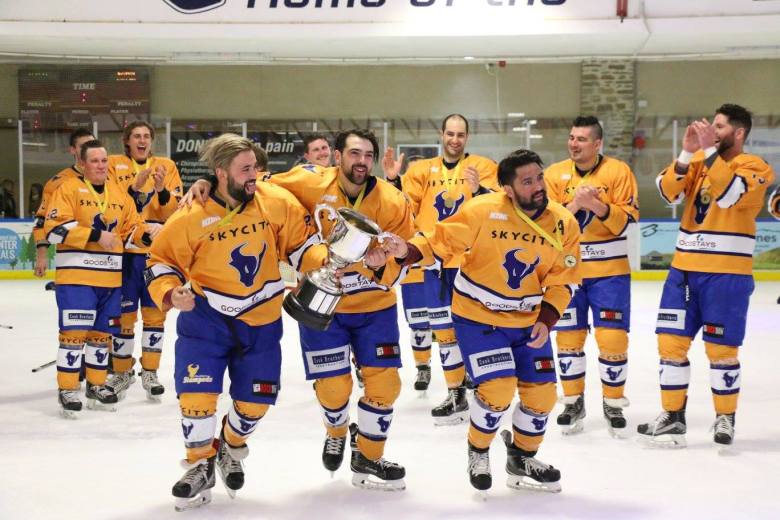
Ice Hockey Classic
Last month the 2018 Ice Hockey Classic was announced, generating a positive buzz on social media for the USA vs Canada exhibition series that sees a three-game tour played in Auckland, Queenstown and Wellington. The latter is set to be an outdoor spectacle at Westpac Stadium similar to what is seen with the NHL’s Winter Classic.
As the curtain raiser for the main event in Auckland there will be a regular season NZIHL game played between the West Auckland Admirals and Botany Swarm. The prospect of playing at Spark Arena to a crowd of prospective new fans is thrilling for those involved – including Botany Swarm head coach Ian Wannamaker who sees this as a great stage to demonstrate the fierce cross-town rivalry his team has with the Admirals, “I would expect there to be some sort of fireworks, if not actual fireworks, definitely a lot of fierce competition on the ice. No one will want to lose and both teams will play very hard and want to not only win but to show the NZ fans who is the top Auckland based club.”
The Ice Blacks will play at the Westpac Stadium outdoor game against a NZIHL All-Stars squad made up of import players from all five teams across the league. It’s a smart initiative by TEG Live and the NZIHF to team up and help give the country’s top-tier clubs, plus the national side, a welcome increase in exposure. Who knows, this may inspire more youth across the country to lace up a pair of skates and grab a stick? Either way, it’s a must-see event for any sporting fan.
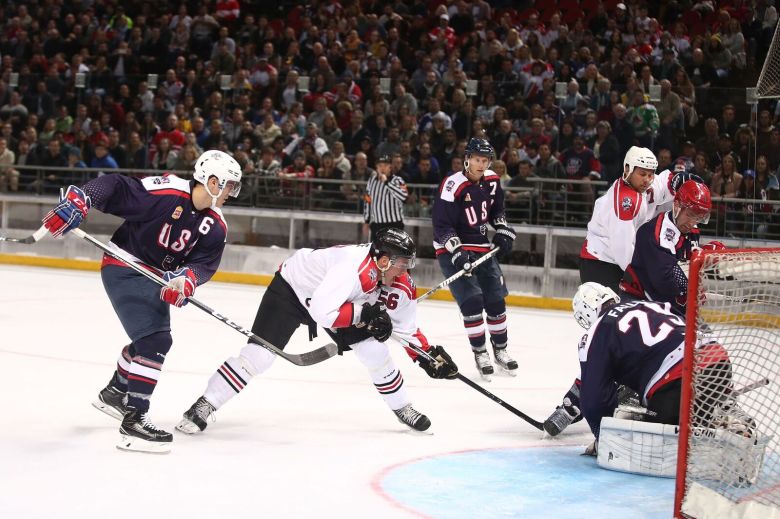
The Continuing Rise of Grace Harrison
This is one of my favourite ongoing stories in New Zealand hockey, perhaps NZ sport in general.
Typically goalie Grace Harrison flies under the radar but the coaching staff at St. Lawrence University aren’t afraid to sing her praises. Saints head coach Chris Wells told reporter Carlos Verde that despite coming in as the team’s third-string netminder, it didn’t take her long to earn the starting role, saying “She chipped away, worked hard, and by mid-January (in her first year) she was our starting goalie and really carried the bulk of playing time.”
By the end of her rookie season Harrison finished with a 7-7-6 record, posting a 2.14 goals against average and a .916 save percentage. Harrison pushed that performance to the next level as a sophomore – for the 2016-17 season she was named as part of the Second-Team All-ECAC Hockey team while also being nominated as a ECAC Hockey Goaltender of the Year finalist. As her play advanced, so did her numbers with an incredible 23-6-4 record, 1.62 GAA and a .923 save percentage to go along with her record-breaking nine shutouts – the most by any goalie in the Saints program.
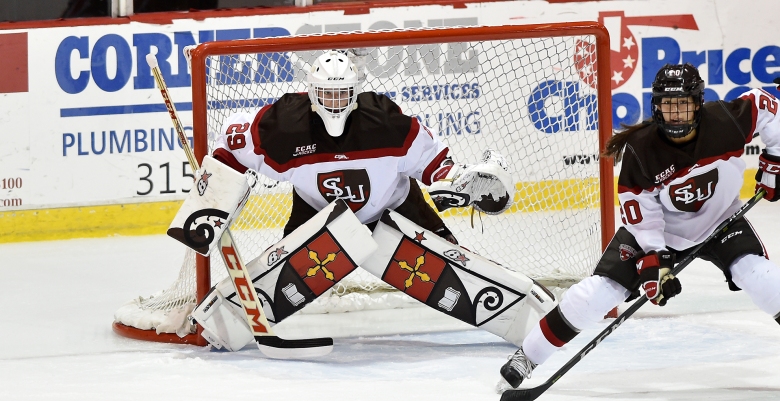
Now well into her third season, Grace Harrison remains a key part of the St. Lawrence roster and this weekend came back from the holiday break with a two-game series against Lindenwood at the Honda Center – home of the NHL’s Anaheim Ducks.
Starting in the second game, Harrison backstopped the Saints to a 3-2 overtime win that improves the 10th-ranked Saints to 10-7-3. Standing in the same crease that is typically home to John Gibson or Ryan Miller will be an experience to savour for this young athlete, but there’s still plenty of hockey to be played before the season wraps up in March.
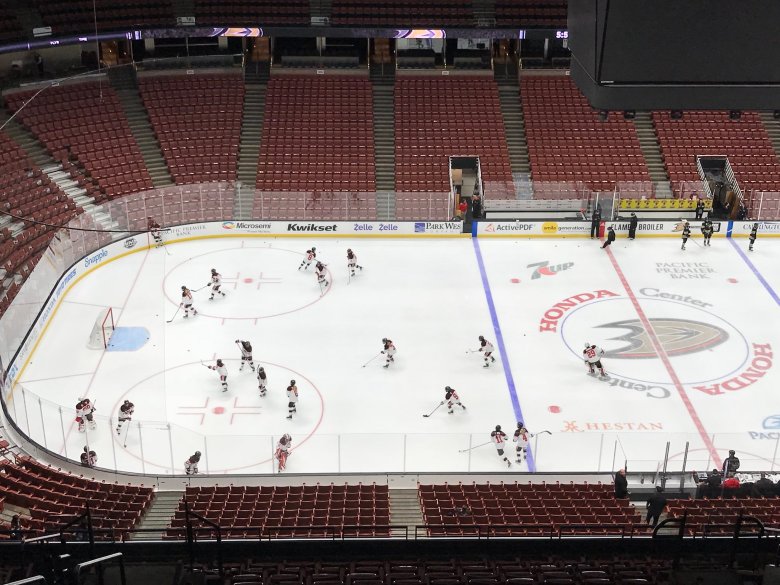
2018 is going to be an action-packed year for New Zealand ice hockey. What are you most looking forward to?
(Main photo: Mike Froger)
]]>We dedicate this week’s podcast to co-host Logan’s incredibly generous Secret Santa. If you don’t know, in New Zealand a nationwide Secret Santa is done via Twitter and it’s the most amazing thing ever!
If you didn’t get involved this year, don’t miss out in 2018 – it’s a heap of fun plus the kindness of strangers can really surprise you.
(Main photo: Skycity Stampede / Source: Facebook)
]]>Auckland’s Spark Arena plays host to the first leg of the tour, with the USA and Canada teams touted to feature current NHL players, veterans, and promising young talent. As a curtain raiser to the main event, the Botany Swarm and West Auckland Admirals will play each other in an official NZIHL game that counts towards the league’s standings.
Spark Arena is home to the NZ Breakers of the Australian National Basketball League with a capacity of around 8,500 for their home games. The arena also plays host to international recording artists when they come to Auckland – most recently Canadian RnB superstar The Weeknd performed his hits to a sold-out crowd.

Playing at such a venue is a brand new prospect for the cross-town hockey clubs as they get the chance to showcase their fiercely competitive rivalry to a wider audience than what would normally fit within their home rinks at Paradice Avondale and Paradice Botany Downs.
Admirals captain Justin Daigle told PUCK YEAH that he is excited and honoured to be part of the 2018 Classic, “This is a huge deal for the entirety of the sport in New Zealand…For us it’s an opportunity to showcase the game we all love to play and really raise the profile and public awareness of hockey.”
He expects that these games will likely attract a new audience to the NZIHL. “As I often say, I’m yet to introduce the sport to a Kiwi who hasn’t fallen in love with it so hopefully this will serve as a catalyst towards new fans and players,” said Daigle.

Newly appointed Botany Swarm head coach Ian Wannamaker shares the passion of his West Auckland counterpart, “You don’t want to miss out on an amazing opportunity to see the fastest game on the planet in your backyard, seeing some of the best athletes in the world compete, and also see how competitive and exciting the local league is. You simply just have to be there.”
With 19 players from the Admirals and Swarm currently in the national team’s wider training squad, that round of the NZIHL season will be split over two weekends to allow their players who also represent the Ice Blacks to travel to Wellington and compete against a NZIHL All-Star team for the outdoor game at Westpac Stadium on June 23rd.
That All-Star team will be made up of import players from the five NZIHL teams, along with a few Kiwi players added to the lineup if needed. Considering the calibre of talent the league is now attracting in what is typically the off-season for ice hockey in North America, expect the Ice Blacks v NZIHL All-Stars game to be one full of action (and perhaps plenty of goalscoring) prior to the main event.

Ice Blacks head coach Anatoly Khorozov is elated that his team will be part of the historic game in Wellington, saying he sees it as a great experience for the players, “I think a lot of players, if not all, will naturally be nervous but will also be very excited. I’d hope nerves will disappear after a few shifts and they will show the crowd that New Zealand has some ice hockey talent too.”
Khorozov hopes the Ice Hockey Classic will be a way of introducing more fans to the national men’s team that compete in annual IIHF World Championship events, the latest held in Auckland earlier this year. “I also hope this event will help Wellington with their ice arena project as more people will be excited to have the game in their city.”

While the rosters for the American and Canadian teams are yet to be announced, Justin Daigle believes no matter who is coming, the outdoor game at Westpac Stadium will be a special event for New Zealand sports fans, “At the end of the day, the players on the ice are secondary to the atmosphere and environment that hockey provides let alone a venue as amazing as an outdoor rink. There’s something about the outdoor games that makes it feel a little closer to the roots and origins of the sport.”
Tickets for the 2018 Ice Hockey Classic with USA v Canada are currently on sale via Ticketmaster for Auckland and Ticketek for Wellington and Queenstown.
(All NZIHL and Ice Blacks photos by Mike Froger – All other photos supplied by TEG Live.)
]]>The pair have played a crucial part in the recent success of the Skycity Stampede in the New Zealand Ice Hockey League. Their suspensions have been backdated to January 1 2017, which includes the Stampede’s third consecutive NZIHL championship win. Neither player will be available to compete again until December 31 2018.
The Frear brothers were identified in an investigation by Drug Free Sport New Zealand with Mitchell found to have purchased a 10ml bottle of clenbuterol spray in October 2014, while Lachlan had made two purchases of the same product in November 2014 and January 2015.
During that investigation, both had admitted in writing to purchasing the product but denied any use of the substance due to never receiving their orders, and claimed that neither held any intention of cheating to gain an unfair advantage.
From their decision, the Sports Tribunal have stated that Mitchell and Lachlan Frear had not researched the substance for further information, or checked with team staff and players, DFSNZ, or seek medical advice from a doctor prior to purchasing clenbuterol.
In a statement New Zealand Ice Hockey Federation (NZIHF) President Günther Birgel has said:
“The NZIHF strongly supports DFSNZ and is a signatory to World Anti-Doping Agency. All players who represent New Zealand sign a contract agreeing not to use illegal or body enhancing substances.
In this case both young players have been naïve in believing that the product purchased was a fat burning product only. Both young men deeply regret not having checked with relevant experts prior to their purchasing decision and have accepted the decision of the Sports Tribunal of New Zealand.
This will serve as a sharp lesson for all of our athletes. From a NZIHF stance, I hope that this will be the only time that our sport is involved in this issue. This matter serves as a reminder to all participants in ice hockey in New Zealand to be vigilant when considering any such substance.”
Birgel went on to confirm that both players have committed to assisting the NZIHF in player education about making ice hockey drug free in New Zealand, along with an increased education requirement at all levels of the sport in 2018.
Stampede team manager Ross Burns told Puck Yeah that he respects the decision made by the Sports Tribunal and won’t be making any further comment on the matter.
(Main photo: Mitchell Frear playing for the Skycity Stampede / Source: Facebook)
]]>The Livestream account that is home to this great archive is up for its annual renewal and likely won’t be renewed for 2018.
You might be wondering how such a thing could happen? Well, that account belongs to Jez Brown of Slapshot Productions – whom would typically keep that Livestream page running because it was needed for producing live game broadcasts across New Zealand. But after being unceremoniously dumped by the NZIHL and NZIHF earlier this year, Slapshot is no longer required to provide and maintain this service.
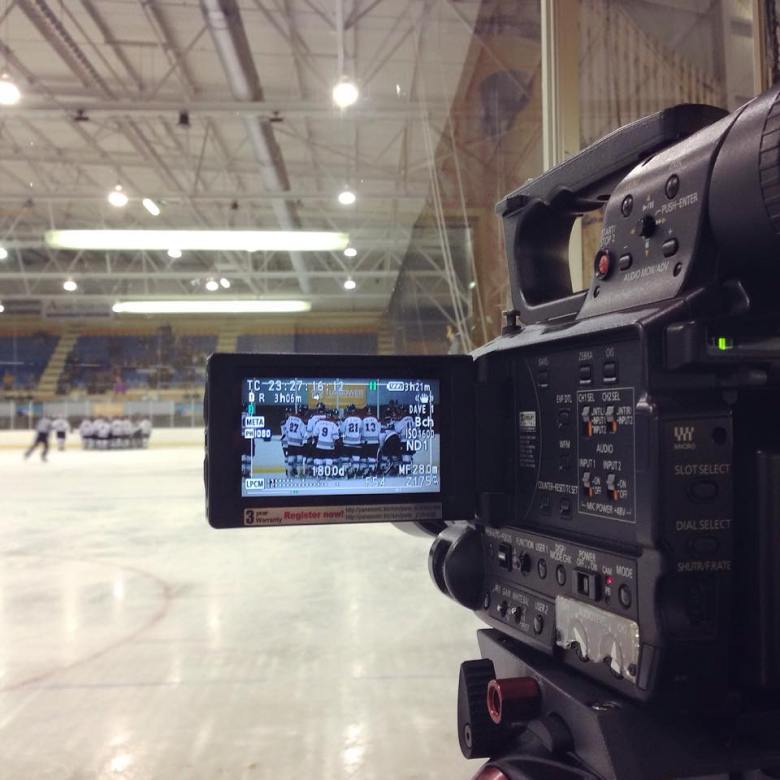
Amongst the soon-to-be-disappearing archive you’ll find the thrilling Birgel Cup championship runs by the Canterbury Red Devils and Skycity Stampede, the Skate Of Origin, plus who could forget the fantastic weekly highlight show TopShelf?
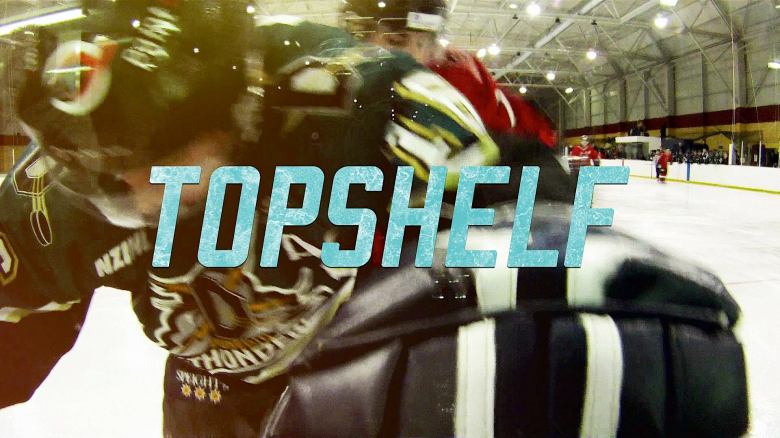
Having no online access to those games is an issue the New Zealand Ice Hockey Federation should look into resolving for the sake of preserving part of our country’s history on the ice.
Whether that happens remains to be seen. In the meantime – be sure to get your fix in before next Saturday.
Main photo: Rachel van Luyt
]]>0:00 – Introducing Josh Kretschmar and wondering whether the Swarm (of Botany) is a bee or a wasp?
2:14 – How hockey won Josh over as a new fan of the sport
4:49 – Becoming a suffering Vancouver Canucks fan
8:05 – EA’s NHL video game series
11:50 – Josh’s first live game experience
13:39 – Like son like father? Josh’s Dad gets hooked on hockey too
14:48 – Getting drafted and playing in the Frontyard Hockey League
15:37 – Josh scores a goal off his face playing Joe’s team in a BHL pre-season game
16:40 – The feeling of playing alongside or against your favourite NZIHL players during the BHL season
20:10 – How Josh got more involved with the Botany Swarm as a dedicated volunteer
23:12 – Poor internet killing NZIHL live streams and the possibility of improving
24:49 – What is on offer for NZIHL season ticket holders?
28:00 – How will the Vancouver Canucks fare in the 2017-18 NHL season
28:45 – Thoughts on the ADIDAS jerseys now that we’ve seen them in action during the NHL pre-season
32:37 – Josh’s favourite player to watch in the Vancouver Canucks
33:47 – Changes happening with the Botany Swarm going into the 2018 NZIHL season
36:54 – Easy ways to spread the word about hockey to get more New Zealanders hooked and more NHL video game chat to wrap things up
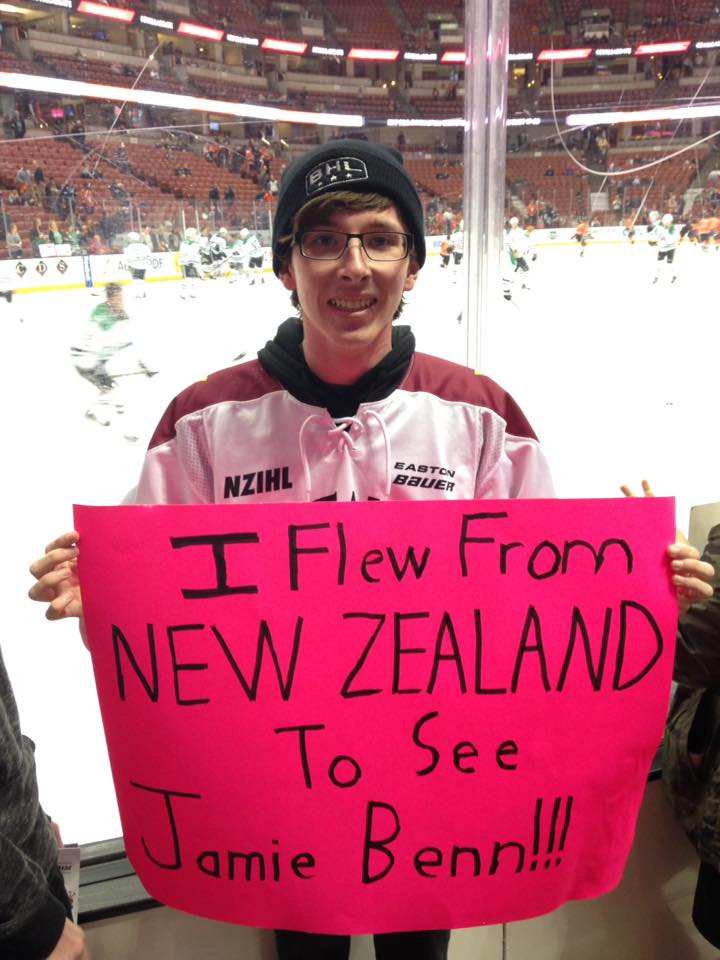
0:00 – Introducing Cam Green and Aaron Somerville from the BHL
1:30 – The BHL’s early days
4:39 – Expanding the BHL to include the FHL (Frontyard Hockey League)
5:13 – The guys get distracted by a random girl outside the studio
6:17 – How the expansion happened and partnering up with Camorra Hockey School
8:50 – Behind the scenes of the BHL Draft
10:43 – The goalie shootout video that went viral
14:20 – Designing the BHL jerseys
15:54 – Breaking down the team structure of the BHL/FHL
21:33 – The BHL Holiday Classic
26:50 – What’s going down at the 2017 BHL Draft
34:50 – Creating all the BHL teams into NHL17
35:38 – Doing in-game hosting & entertainment for the NZIHL’s West Auckland Admirals
37:00 – Pissing off the visiting teams with their in-game antics
38:25 – The creation of Rusty Anchor-Bottom, the Admirals mascot
40:15 – Adding the national anthem and developing the Admirals in-game presentation
44:44 – Can the NZIHL go bigger?
48:49 – The general lack of awareness of hockey’s existence in New Zealand
54:25 – Cam and Aaron’s early days of playing hockey in Canada
57:00 – Cam and Aaron turn the tables and ask the questions
58:03 – The passion of New Zealand sports fans
1:01:44 – Cam and Aaron’s favourite NHL teams
1:03:20 – Cam’s jersey collecting mission
1:05:48 – Allowing hockey players to show more of their personality in media interviews
1:07:20 – Speculating about what hockey will look at the next Winter Olympics
1:14:19 – Cam and Aaron’s favourite hockey movies
1:17:36 – Cam’s Dad has a special message for Joe
1:21:11 – Cam and Aaron hijack the ending for a line of dirty questioning
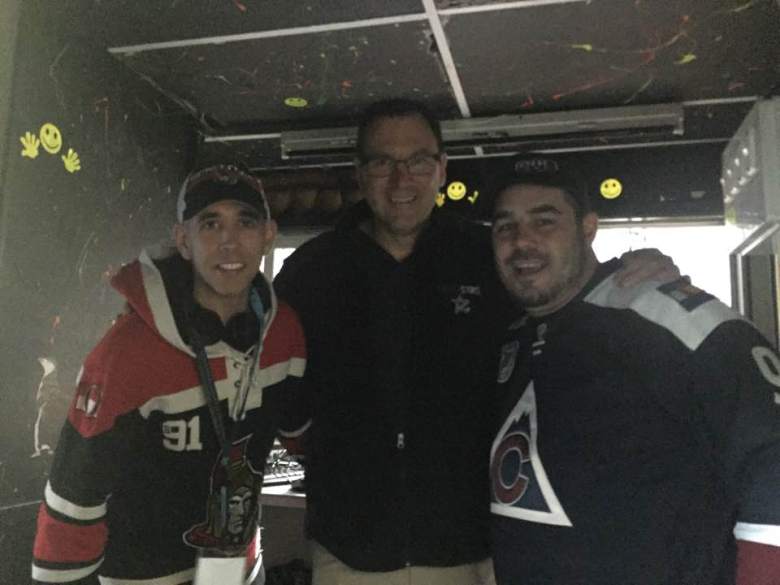
While I can’t say I’ve done any sort of extensive research on it, I often have wondered about how the points system affects games and the coaching strategy within it. So I thought I’d compare three systems: FIFA, NZIHL, and the NHL.
First, let’s lay out the structure of how it works. Leagues value the outcome of games differently.
In soccer/football, FIFA changed the structure of points in the 1980s to three for a win, and one for a draw. This change was to give an incentive to go for a win and avoid a draw. The NHL in 1999 changed from the same two for win, one for draw into the system that exists today with two for a win still, one for an overtime loss. The IIHF/NZIHL format is three for a regulation win, two for an overtime or shootout win, one for an overtime or shootout loss.
Game Theory
So how does this affect coaching decisions? Should they at all? Are there ‘unintended consequences’?
Well, without assigning an emotion to them, we can start to see the incentive pattern involved. Not too long ago, hockey was like soccer in the sense that they were ok with draws as a result within their regular seasons. However, the NHL diverged from this idea and in 1999 they changed it to where the OTW gets two points, but the OTL still gets one.
So what has this done? I don’t have the statistics to suggest that the reality matches the theory, but the optimal outcome for an NHL game for any team is now to end regulation drawn.
How’s that? Any game ending at regulation awards two points, and any game that goes into overtime awards three. This means that on average, any OT game is 50% more valuable to the two teams playing in it.
If you compare the NHL to FIFA, you find the exact opposite scenario. If a win occurs, three points are awarded. If there is a draw, only two points are awarded. This means there is a 50% incentive to win over a draw on average. A team is rewarded for going for a win, but it’s not that simple. More on that later.
In the NZIHL, and IIHF, a three-level system rewards an outcome of any kind. This means that in regulation a win is worth three points, but if things can’t be decided the efforts of overtime are worth 1/3 of the regular game, and the two other points are split.
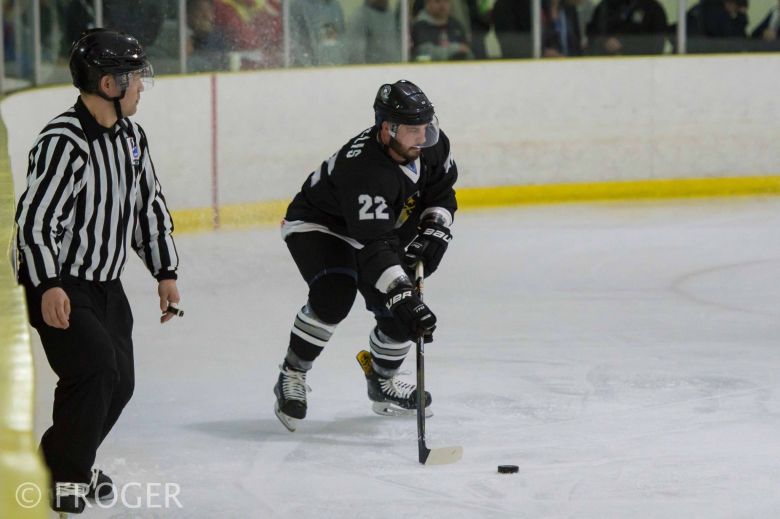
Strategy
Thus if we get into strategy, what does this mean in the real world? While it is speculative, my experiences seem to tell me a few things.
First, in soccer, this approach seems to reward offensive emphasis. Of course, this only exists in games where three outcomes are viable; if extra time and shootouts are around, this provides a very different game theory. However within a 90-minute contest, games have over a generation become more open and more likely to incentivise teams to work for leads in the first 80% of the game. However if teams enter the closing moments with the score locked up, they tend to be willing to accept the single point as an acceptable result. Conservative play in this area tends to be about ‘managerial preservation’, but it would still be a better play if the team needing points had a less-than-two-thirds chance of getting countered and beaten.
Heading over to the NHL, as I’ve already pointed out, teams actually have a true advantage of ending in a regulation draw.
Teams seem to play out fairly normally under the system because goals have a tendency to occur with consistency at any time of a game. While soccer has about 3.4 goals a match, hockey usually has about 5.5. This means that a goal occurs every 11 minutes, instead of the 26 or so in soccer.
Teams play defensively when entering with a draw, but teams just one goal behind have every incentive to win a point. Pulling a goalie with a reasonable amount of time to be effective is, as it always has been, a reasonable approach. One or three goal losses are only a mental balance; they have near zero significance elsewhere (Season Goal Diff is the final tiebreaker).
However once in a draw, a team has a chance to win another point based on a 5-minute 3v3 OT + shootout. These contests are worth “half of a regulation win”, and losing them has zero downside. Put another way, the Washington Capitals earned 118 points in 2016-17; most in the league. They won 55 games (incl. OT/SO). If they had drawn every game and won half of those, they’d have 123 points. Regulation draws are clearly encouraged by this system.
Finally, let’s discuss the NZIHL. It’s similar to FIFA, but it has an overtime point on offer like the NHL. Thus, you have elements where a win in regulation is vastly more important when compared to a direct opponent. You go three points clear of whom you beat in regulation, and only one point clear after an OT win. It values regulation as triple the effort, and OT shares the same spoils that were on offer otherwise.
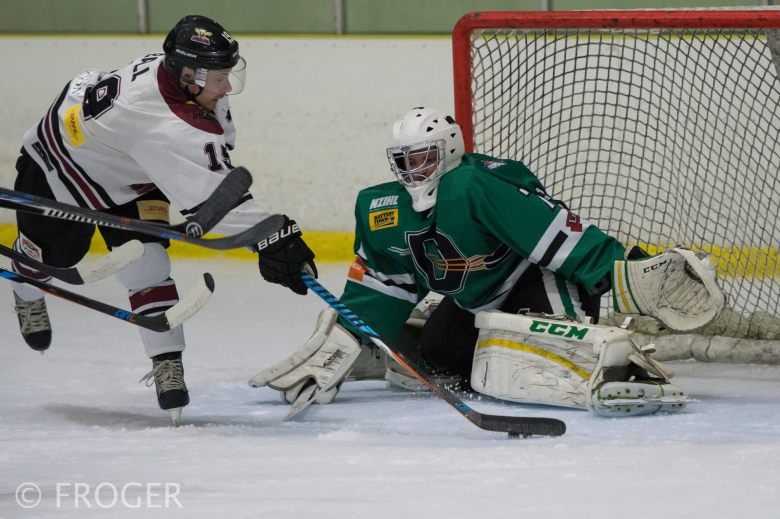
So which one is best?
It’s impossible to say whether the intended outcomes are better or worse, but they all seem to be a mechanism for driving the kind of play that FIFA, the NHL, and the NZIHF want in their competitions.
FIFA want attacking football and I think that they have done it. They’ve dealt with issues about match outcomes in the World Cup, and generally have an equitable system for their game without overly punishing draws.
The NHL have a system that is designed to work towards parity and exciting finishes with skill as the tiebreaker and no fear of getting into a draw. The NZIHL takes an even approach in emphasising winning in regulation, but still offers a 2/3 win to the victors, and 1/3 to the OT losers.
Well, before I simply write off the NHL for being “unfair” in its offering, and saying NZIHL is clear in its offering, there is an amazing effect that the NHL gets in its public relations without much fanfare.
Within the NZIHL standings, you see a 3/2/1/0 (W/OTW/OTL/L) that you can always add up. It’s four numbers and people don’t relate to it. With the NHL, you have W/L/OTL. You get three numbers but really just two matter: wins and overtime losses.
A simple formula of 2*W+OTL=Points. But when you look at all of the records, the clubs have better (or at least better looking) win-loss records than they technically should. The wins column combines regulation and overtime victories since they’re worth the same amount of points. You also split OT losses out of the loses column and into the column that North Americans associate with a “draw”, which is what it really is. Thus even a team with less than half the points on offer can appear to have a “winning record”. It’s a mirage, but it works.
What do you think? Should the NZIHL adopt the NHL scheme or stick with the status quo? Feel free to leave a comment below.
(Main photo: Mike Froger)
]]>0:00 – We’re back! Why were we away for so long?
2:00 – Bringing in Ian Wannamaker
4:00 – Playing junior hockey in Canada
7:00 – Ian’s only fight in the NZIHL
8:30 – Gaining NZ citizenship and being selected by the Ice Blacks
9:40 – Traveling to Iceland for an Ice Blacks tournament
12:45 – Showing our love for Tim Hortons
14:00 – Other favourite countries Ian has traveled to playing for the Ice Blacks
15:00 – The growth of New Zealand’s hockey game
19:30 – Being a hockey play-by-play commentator and the New Zealand v Mexico rivalry
22:10 – Building up the rivalry between NZ and Australia to attract more casual fans
24:40 – Ian’s time playing for the Botany Swarm and winning three NZIHL championships
26:10 – The Botany Swarm’s current struggles and how they can turn it around
28:40 – What an assistant coach does within a hockey team
30:45 – Can the NZIHL grow further and perhaps add a Wellington team?
33:40 – Does having import players help or hurt the development of NZ players?
38:49 – Being part of the NZIHL 100 club and favourite memories
41:45 – What can the NZIHF do to help grow hockey further in New Zealand?
47:10 – Favourite hockey movies
50:44 – Video game consoles from our childhood
52:40 – The NHL’s next-gen coming through and how NZ can learn from their marketing
56:45 – Ian being a life-long Toronto Maple Leafs fan
59:19 – Daydreaming about NHL players flashing their cash and investing in NZIHL teams
1:00:40 – The realities of being a NZIHL import and attracting new players
1:03:59 – Is the NZIHL a dangerous league to play in?
1:08:22 – Let’s wrap it up!
